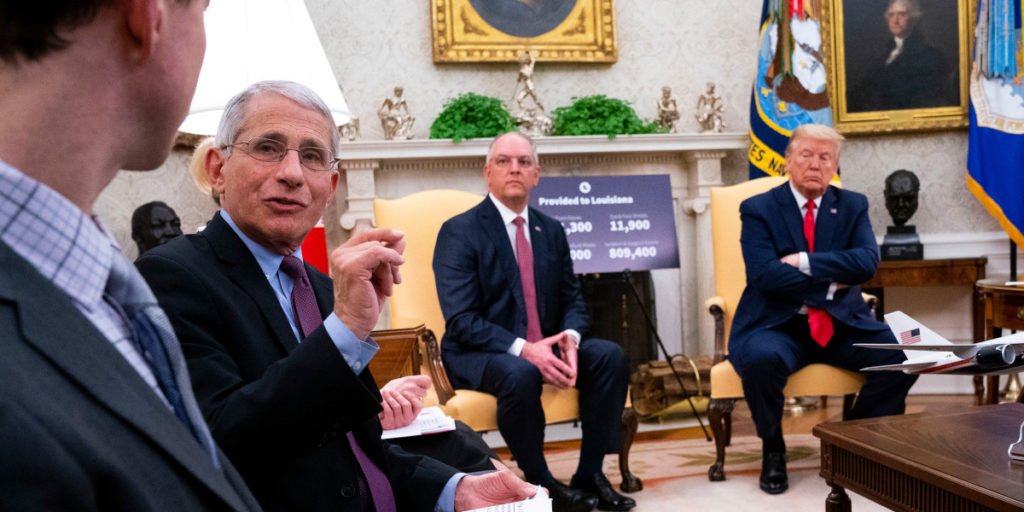The news was delivered to President Donald Trump by Anthony Fauci, head of the National Institute of Allergy and Infectious Diseases (NIAID), who said covid-19 patients who received the antiviral drug recovered 31% faster, in 11 days instead of 15, in a placebo-controlled trial carried out by his agency.
“Even though it doesn’t seem like a knockout 100%, it is a very important proof of concept. What it has proven is that a drug can block this virus,” Fauci said while seated on a couch in the Oval Office, with Trump looking on.
The finding that remdesivir helps covid-19 patients is a step toward getting us out of the health and economic disasters caused by the pandemic, and fuels hopes that more will follow. Later in the summer new antibody drugs to battle the infection could be available, and vaccines could arrive in the months after that.
Scott Gottlieb, former commissioner of the Food and Drug Administration, told CNBC that remdesivir could be part of a “robust toolbox,” including better testing, that “could mitigate the risk, and the fear that this is a race to the bottom and that there is nothing there to help you.”
“I think all of this is going to put us in a much different posture for the fall,” Gottlieb said, “and allow us to get back to some semblance of our normal lives, even with covid circulating in the background.”
Remdesivir is made by Gilead Sciences, a biotechnology company based in Foster City, California, whose previous successes included a blockbuster cure for hepatitis C.
The clinical data still has not been published, and a previous report from China saw no benefit in severe cases. But if the new findings hold up, remdesivir will quickly become the mainstay treatment for covid-19.
Emergency approval by the FDA is likely, and you can expect a huge scramble by Gilead to make enough of the medicine.
In his comments, Fauci compared the early result to the introduction of AZT, one of the first medicines to prove modestly successful in treating HIV, the virus that causes AIDS. After AZT, he said, ever more effective medications became available.
Besides the shorter recovery times, there were also signs remdesivir reduced the chance of dying from covid-19, but that data was not as definitive. The death rate for patients who got the drug was 8%, versus 11.6% for those who didn’t. Either way, the figures were a reminder of the significant chance that anyone admitted to the hospital because of covid-19 respiratory problems will die.
The NIAID study started on February 21. Half the patients got Gilead’s remdesivir and half got a placebo drug.
The first patient to join the trial was an American who caught the virus on the Diamond Princess cruise ship and was treated at the University of Nebraska. In total, about 1,000 patients joined the study, at sites in the US, Germany, Spain, Greece, and the United Kingdom, among other locations.
The reason remdesivir was available to try against covid-19 so quickly is that it is a repurposed drug—meaning it’s already been studied for other uses. Previous lab experiments showed it could block the SARS virus in the lab, and it was tried on patients with Ebola. The drug inhibits a molecule that RNA viruses need to make new copies of themselves.
On April 4, Gilead CEO Daniel O’Day said the company had enough of the drug on hand to treat 140,000 people and that those doses were being used in clinical trials or being offered to patients “at no charge.”
Huge questions now surround issues like how to distribute doses fairly, and what the medicine could cost. An explosive debate over who gets the drug, including what countries get the limited supplies, seems unavoidable.
The manufacturing of remdesivir occurs in stages—chemicals are added in synthetic steps—and it takes several months to create a batch.
Gilead said it had stepped up production and could make enough of the drug to treat a million people by the end of the year. However, more than three times that many cases have already been confirmed, and at least 224,000 people have died from the disease as of April 29.
More study is needed to pinpoint the optimal dose and the types of patients who benefit most.
A group of researchers said in a white paper released this week that the US government should allow more companies to manufacture the drug and take steps to repurpose chemical production lines to make large amounts of it.
That group, which includes Harvard University chemist Stuart Schreiber, says remdesivir should be given soon after symptoms start, and in higher doses. “We speculate that the current dose is chosen because of limited supplies. We urge the government to determine the facts around this issue so optimal trial doses for efficacy can be determined,” they wrote.
Gilead separately reported results of a study in which five-day and 10-day courses of remdesivir seemed to have similar effects. Shorter courses would be a way to ration supplies.
